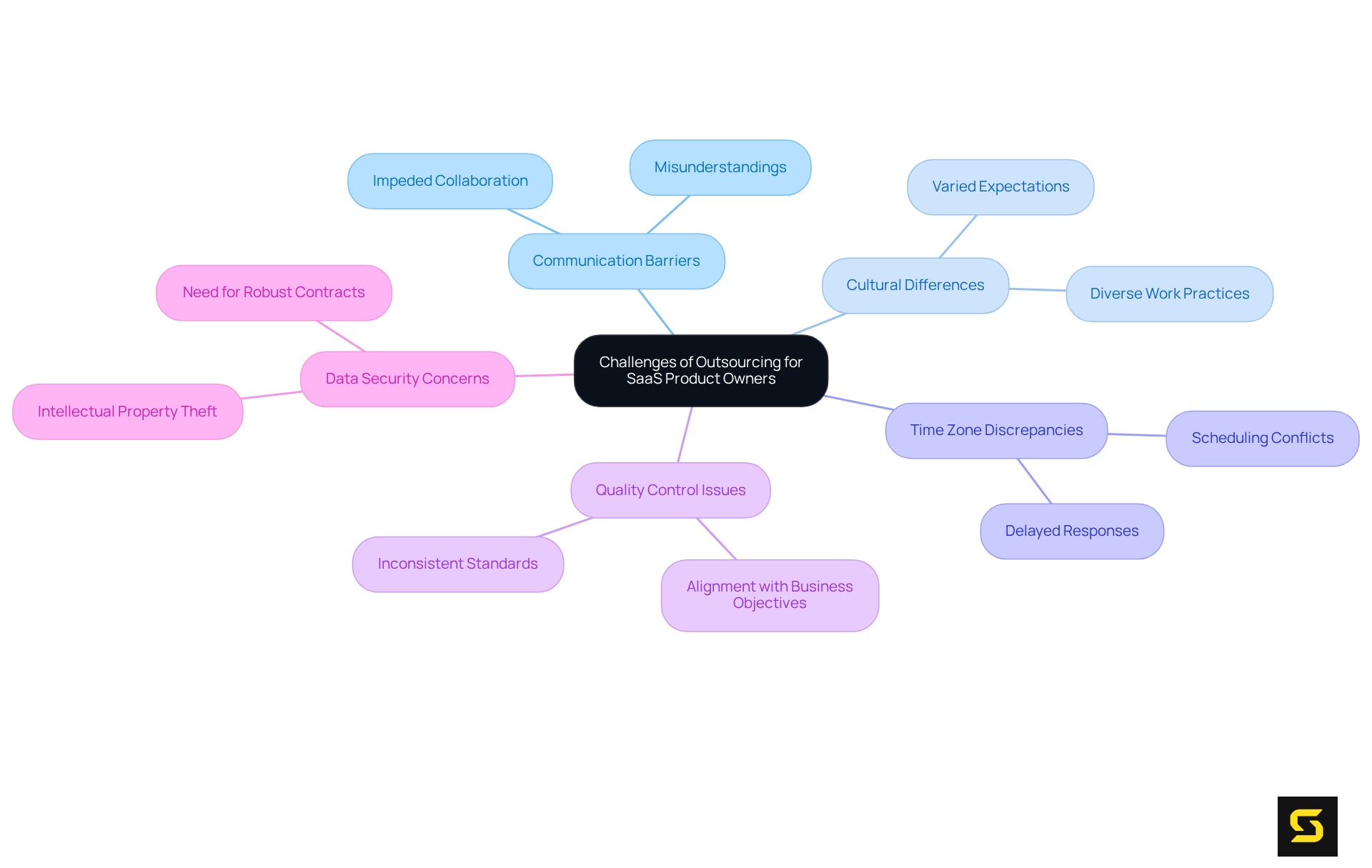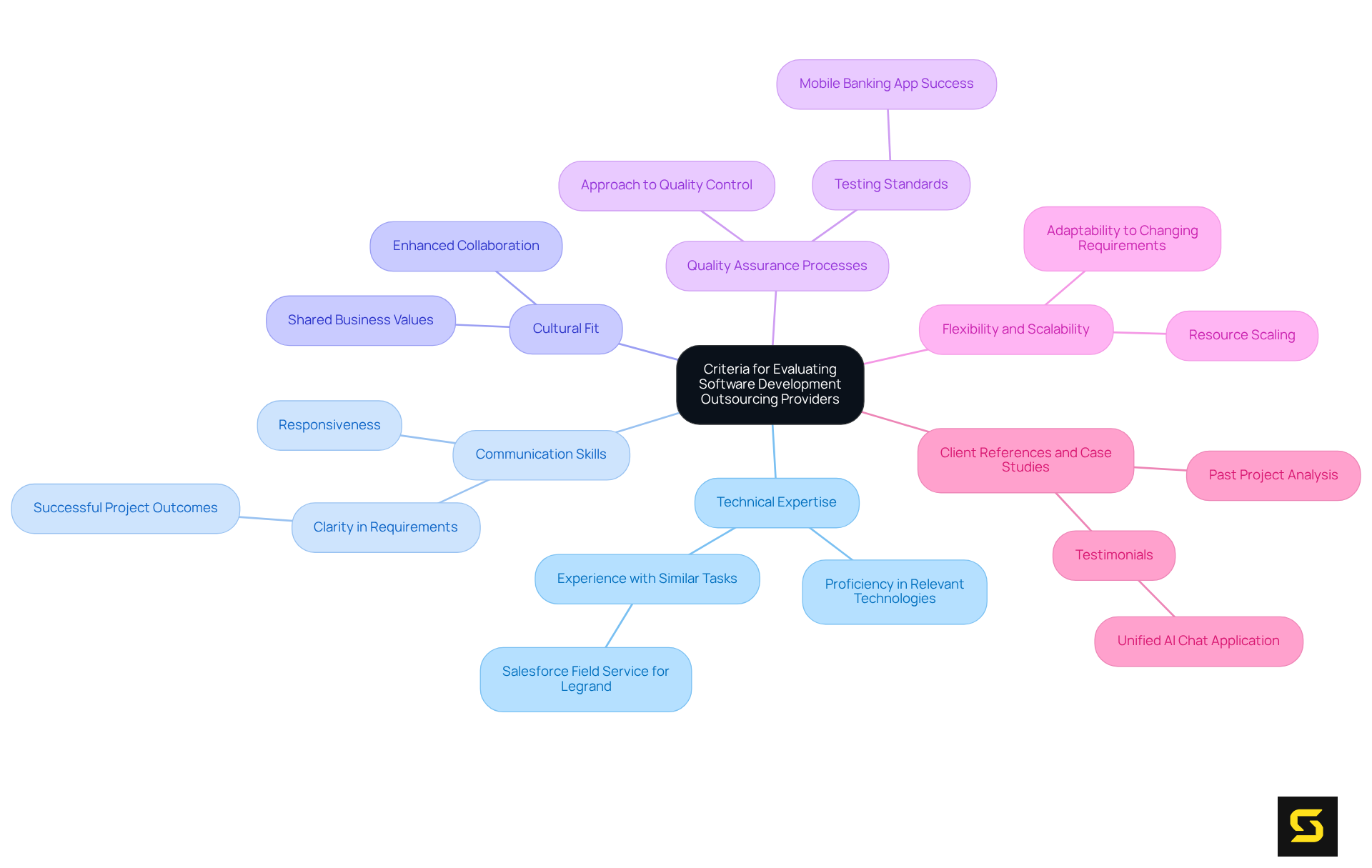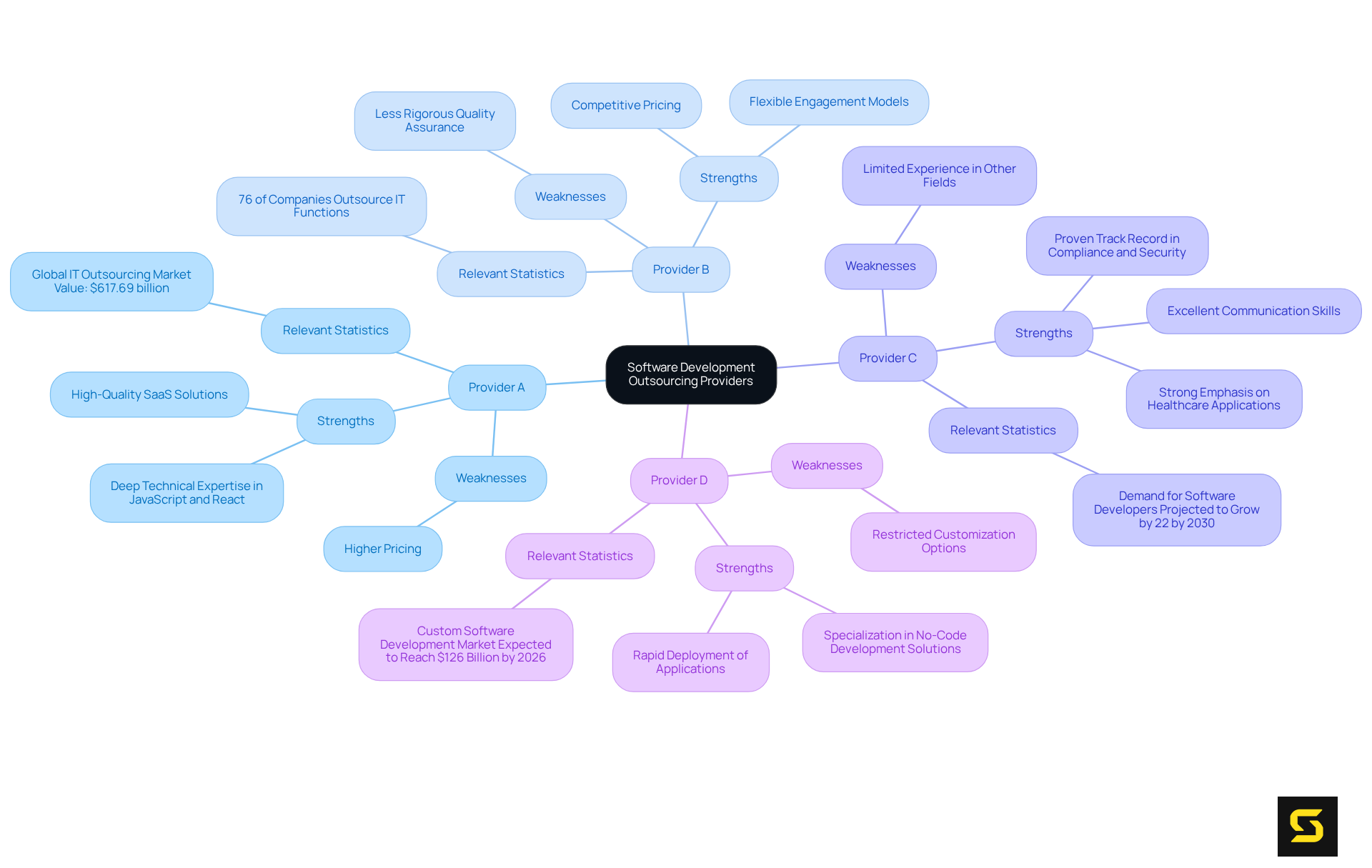Overview
This article provides a comprehensive comparison of top software development outsourcing services tailored for SaaS owners. By evaluating various providers against essential criteria such as technical expertise, communication skills, and flexibility, it establishes a clear standard for selection. The strengths and weaknesses of multiple outsourcing providers are detailed, highlighting the critical nature of choosing a partner that aligns with specific project needs and business goals. In a competitive market, this alignment is not just beneficial; it is essential for success. Therefore, SaaS owners must consider these factors carefully to ensure they partner with the right outsourcing service.
Introduction
The landscape of software development outsourcing is evolving at an unprecedented pace, presenting SaaS owners with both exciting opportunities and formidable challenges. By leveraging specialized skills and reducing costs, these firms can significantly accelerate project timelines and enhance operational efficiency. However, the complexities of communication barriers, cultural differences, and quality control can complicate the outsourcing journey.
How can SaaS leaders effectively navigate these hurdles to select the right partner and ensure successful collaboration? This article delves into the leading software development outsourcing services, providing a comprehensive comparison to empower SaaS owners in making informed decisions that align with their business objectives.
Understanding Software Development Outsourcing
Software development outsourcing services represent a strategic approach to assigning software creation tasks to external service providers. This enables SaaS firms to leverage , reduce expenses, and accelerate timelines by utilizing software development outsourcing services. Such a method can manifest in various forms, including:
- Complete task delegation
- Staff enhancement
- Specialized teams
Each offering unique advantages. For instance, task delegation grants access to a global talent pool, allowing companies to scale resources in alignment with project demands without the burden of hiring full-time staff. Notably, this approach to software development outsourcing services transforms development into a variable expense, providing significant financial flexibility for businesses.
Research indicates that using software development outsourcing services for delegating tasks can shorten time-to-market by as much as 40%, a critical advantage for software companies striving to maintain a competitive edge. However, effective management is paramount to ensure that software development outsourcing services align with business objectives and maintain quality standards. Implementing strategies such as establishing clear communication channels and utilizing project management tools can greatly enhance collaboration and oversight.
Furthermore, many software-as-a-service firms adopt a hybrid strategy, retaining product management and design internally while relying on software development outsourcing services for essential development tasks. This enables organizations to preserve control over their product vision while reaping the benefits of external expertise. Importantly, 78% of companies recognize the value of acquiring specialized knowledge through software development outsourcing services, which underscores its role in enhancing operational efficiency.
As industry leaders like Peter Thiel assert, concentrating on core competencies while leveraging external expertise can markedly elevate overall performance and foster innovation in software development.
![]()
Challenges Faced by SaaS Product Owners in Outsourcing
SaaS product owners face significant challenges when delegating software development.
- Communication barriers
- Cultural differences
- Time zone discrepancies
These factors can severely impede collaboration and project advancement. Furthermore, maintaining quality control and alignment with business objectives becomes increasingly complex when engaging with external teams.
The potential for intellectual property theft and data security concerns necessitates robust contractual agreements and a foundation of trust in the chosen partner. Understanding these challenges is crucial for software-as-a-service owners to select the right external partner for software development outsourcing services and develop productive working relationships.
By addressing these issues proactively, SaaS leaders can enhance their operational efficiency and drive project success.

Criteria for Evaluating Software Development Outsourcing Providers
When evaluating software development outsourcing providers, SaaS owners must consider several key criteria that can significantly impact their operations:
- Technical Expertise: Assess the supplier's proficiency in relevant technologies and their experience with similar tasks. For example, the Salesforce Field Service initiative for Legrand not only demonstrated technical know-how but also led to increased optimization and faster close times for field appointments, underscoring the direct influence of technical expertise on operational efficiency.
- Communication Skills: Effective communication is essential for successful collaboration; thus, evaluate the provider's responsiveness and clarity. A robust partnership often hinges on open communication, as evidenced by projects where clear requirements led to successful outcomes.
- Cultural Fit: A shared understanding of business values and practices can enhance collaboration and results. Organizations that align culturally with their partners typically experience smoother execution and .
- Quality Assurance Processes: Scrutinize the supplier's approach to quality control and testing to ensure high standards. For instance, the development of a mobile banking app that significantly boosted user engagement and retention rates exemplifies how rigorous QA processes contribute directly to product success.
- Flexibility and Scalability: The ability to adapt to changing requirements and scale resources as needed is crucial for SaaS initiatives. In fast-paced markets, software development outsourcing services that can swiftly respond to evolving needs provide a competitive edge.
- Client References and Case Studies: Analyze past projects and client testimonials to gauge the company's reliability and success rate. Case studies, such as the unified AI chat application that received positive feedback for its design and user experience—where over 70% of users reported enhanced efficiency and satisfaction—serve as vital indicators of a company's capabilities.
By implementing these standards, software service providers can effectively evaluate potential external partners for their software development outsourcing services and select the one that best aligns with their needs.

Comparative Analysis of Leading Software Development Outsourcing Providers
In this comparative analysis, we explore several prominent software development outsourcing providers, evaluating them against key criteria relevant to SaaS owners:
- Provider A: Renowned for its deep technical expertise in JavaScript and React, Provider A excels in delivering high-quality SaaS solutions. However, their pricing tends to be on the higher side, which may be a consideration for budget-conscious startups. According to Mordor Intelligence, the global IT outsourcing market is currently valued at $617.69 billion, underscoring the competitive landscape in which Provider A operates.
- Supplier B: Acknowledged for its competitive pricing and flexible engagement models, Supplier B presents an appealing choice for startups. Nevertheless, their quality assurance processes may not be as rigorous as those of larger firms, potentially impacting the final product's reliability. As noted by 10Pearls, 76% of companies outsource IT functions, highlighting the trend towards cost-effective solutions like those offered by Supplier B.
- Provider C: With a strong emphasis on healthcare applications, Provider C boasts a proven track record in delivering compliant and secure solutions. Their communication abilities receive significant acclaim; however, their experience in different fields may be limited, which could be a disadvantage for business owners across various sectors. The increasing demand for software developers, projected to grow by 22% by 2030, underscores the importance of specialized providers like Provider C.
- Provider D: Specializing in no-code development solutions, Provider D caters to businesses seeking rapid deployment of applications. However, their restricted customization choices might not satisfy the requirements of all software as a service owners, particularly those needing personalized solutions. The custom software development market is expected to reach $126 billion by 2026, signaling a growing opportunity for companies like Provider D to innovate.
By comparing these vendors side-by-side, SaaS owners can more effectively determine which external partner aligns with their specific project needs and business goals. This analysis emphasizes the importance of considering both strengths and weaknesses when selecting , especially in a market projected to grow to $806.53 billion by 2029.

Conclusion
Software development outsourcing services present a strategic opportunity for SaaS owners to enhance efficiency, reduce costs, and expedite project timelines. By leveraging external expertise, businesses can concentrate on their core competencies while adeptly responding to market demands. This approach not only transforms development into a variable expense but also unlocks access to a vast pool of specialized skills that can significantly elevate product quality and foster innovation.
Key arguments throughout this discussion illuminate the diverse forms of outsourcing, the challenges faced by SaaS product owners, and the critical criteria for selecting an appropriate outsourcing partner. Effective management, clear communication, and a strong cultural alignment are essential for overcoming common obstacles, such as time zone discrepancies and quality control issues. Furthermore, a comparative analysis of leading outsourcing providers highlights the necessity of aligning technical expertise and flexibility with business needs to ensure successful project outcomes.
In an ever-evolving landscape where the demand for software solutions continues to surge, the importance of selecting the right outsourcing partner cannot be overstated. SaaS owners are urged to proactively address potential challenges and leverage the insights shared in this article to make informed decisions. By doing so, they can fully harness the potential of software development outsourcing services, ultimately propelling their businesses toward greater success and innovation.
Frequently Asked Questions
What is software development outsourcing?
Software development outsourcing refers to the strategic practice of assigning software creation tasks to external service providers, allowing companies to leverage specialized skills, reduce costs, and accelerate project timelines.
What are the different forms of software development outsourcing?
The different forms include complete task delegation, staff enhancement, and specialized teams, each offering unique advantages to businesses.
How does task delegation in outsourcing benefit companies?
Task delegation allows companies to access a global talent pool, scale resources according to project demands, and convert development costs into variable expenses, providing financial flexibility.
What impact does software development outsourcing have on time-to-market?
Research indicates that using software development outsourcing for task delegation can shorten time-to-market by as much as 40%, which is crucial for maintaining a competitive edge.
What is essential for effective management of outsourced software development?
Effective management is crucial to ensure alignment with business objectives and quality standards. Key strategies include establishing clear communication channels and utilizing project management tools.
What is a hybrid strategy in software development outsourcing?
A hybrid strategy involves retaining product management and design internally while outsourcing essential development tasks, allowing organizations to maintain control over their product vision while benefiting from external expertise.
Why do companies value specialized knowledge in outsourcing?
78% of companies recognize the value of acquiring specialized knowledge through software development outsourcing, highlighting its role in enhancing operational efficiency.
What do industry leaders think about software development outsourcing?
Industry leaders, like Peter Thiel, believe that focusing on core competencies while leveraging external expertise can significantly improve overall performance and foster innovation in software development.





